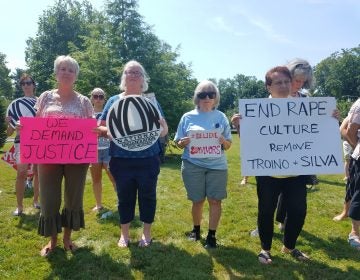N.J. judge who cited ‘good family’ in teen rape case to stay on bench
A judge who sparked outrage with his comments about a teenager accused of rape is staying on the bench, over the objections of a high-ranking state senator.

(JanPietruszka/Bigstock)
A New Jersey judge will keep hearing cases after he was rebuked over his handling of an alleged sexual assault by a teenage boy at an alcohol-fueled pajama party, a spokeswoman for the Judiciary said Wednesday.
As word spread of his comments in the case, a high-ranking state senator called for his immediate removal.
That judge, James Troiano, 69, had denied a request by prosecutors to try to the 16-year-old boy as an adult due to the severity of the alleged offense. But he was overruled last month by appellate judges who admonished him not to show bias toward privileged teens.
According to investigators, a 16-year-old girl was stumbling, visibly drunk at a party in New Jersey when the boy, who was also intoxicated, brought her into a darkened room and barred the door with a foosball table.
He penetrated her from behind as her head hung down, filming the encounter on his phone and later sending the recording to his friends, prosecutors said. He also texted: “When your first time having sex was rape,” although he denied it was rape in another text.
New Jersey law allows juveniles as young as 15 to be tried as adults when they are accused of serious crimes like sexual assault. That’s what prosecutors sought in this case, arguing the boy’s behavior was “calculated and cruel” and filming the encounter was “a deliberate act of debasement.”
But Troiano, sitting in Monmouth County, denied the request. He said the boy was an Eagle Scout who “comes from a good family” and “is clearly a candidate for not just college but probably for a good college.”
Prosecutors should have explained to the girl’s family the “devastating effect” the request could have on the boy’s life, Troiano added. He also distinguished between sexual assault and rape, saying the “traditional case of rape” is when two or more males rough up a woman at gunpoint in an abandoned house or shed.
An appellate court rebuffed Troiano in a blistering opinion that cleared the way for the boy to be tried in adult criminal court, where he faces a much longer sentence.
“That the juvenile came from a good family and had good test scores we assume would not condemn the juveniles who do not come from good families and do not have good test scores from withstanding waiver applications,” the appellate judges wrote.
Troiano retired from the bench in 2012 but was called back to service shortly thereafter, Judiciary spokeswoman MaryAnn Spoto said. She said he will continue to hear cases. Asked whether Troiano would face discipline over his handling of the case, she declined to comment.
That is not sitting well with state Sen. Loretta Weinberg, D-Bergen, who is also Senate Majority Leader. Weinberg says Troiano and another judge who made questionable comments in a similar case should be removed immediately.
“Their conduct is unacceptable. There is no place for this parochial, dismissive and sexist behavior in our justice system,” Weinberg said.
Mitchell J. Ansell, an attorney who represented the 16-year-old boy, did not return a message seeking comment.
The case, first highlighted by New Jersey 101.5, is the latest across the nation to raise questions about how judges treat sexual assault allegations.
Among the most high-profile recent cases was that of Aaron Persky, a California judge who sentenced 19-year-old Stanford student Brock Turner to just six months in jail for sexually assaulting an unconscious woman in 2015. Persky was recalled last year by California voters.
The New Jersey appellate division admonished a second judge in a separate sexual assault case just three days after it overruled Troiano last month.
Judge Marcia Silva, sitting in Middlesex County, had similarly denied prosecutors’ request to try a 16-year-old boy as an adult after he allegedly pushed a 12-year-old girl onto a bed and raped her until she began to bleed.
As part of her reasoning, Silva said the girl did not suffer physical or emotional injuries “other than the ramifications of losing her virginity, which the court does not find to be especially serious harm in this case.”
The appellate judges reversed her, though, citing her “minimization of the harm wrought on a twelve-year-old child” and pointing out the boy could be culpable even if the girl had consented because of her age.
Spoto, the Judiciary spokeswoman, said neither the courts nor the judges had a comment on the cases. Silva was appointed to the bench in 2014 and is serving a seven-year term.
The names of the children, as well as the dates and locations of the alleged sexual assaults, are not included in the appellate court rulings.
J.C. Lore, director of trial advocacy at Rutgers Camden Law School, said being “waived” to adult criminal court has huge implications for teen defendants.
Not only will they likely face longer sentences, he said, but they also could serve much of that time in adult prisons that lack the educational services of juvenile detention facilities and where they are more at risk of trauma as well as physical and sexual abuse.
“All of those things, plus additional things, make it less likely that a child is going to come out of that adult prison rehabilitated and be able to get back into society and function at an appropriate level,” Lore said.
Spoto said 450 requests to waive minors to adult court have been granted in New Jersey since 2015.
WHYY is your source for fact-based, in-depth journalism and information. As a nonprofit organization, we rely on financial support from readers like you. Please give today.




